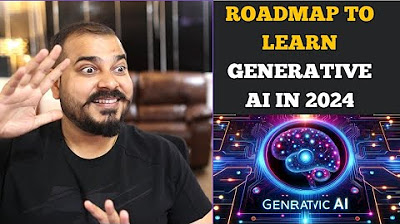Roadmap to Learn Generative AI(LLM's) In 2024-Krish Naik Hindi #generativeai
Summary
TLDRIn this engaging video, Krishna Nayak introduces a comprehensive roadmap for data scientists and analysts looking to transition into the realm of generative AI and large language models (LLMs). The script emphasizes key prerequisites, including programming languages like Python, machine learning concepts, and essential knowledge in natural language processing and deep learning. By breaking down core topics and providing actionable insights, the video guides viewers through the necessary steps to harness the power of generative AI in real-world applications. Viewers are encouraged to subscribe for more informative content and practical projects.
Takeaways
- 🚀 Generative AI is increasingly used by companies for various business use cases, making it crucial for data scientists and analysts to be proficient in this area.
- 📚 The video offers a roadmap for those interested in entering the field of generative AI, specifically for aspiring data scientists.
- 🧑💻 A solid understanding of machine learning algorithms is a prerequisite for anyone looking to work with large language models (LLMs).
- 📊 Knowledge of programming languages, especially Python and JavaScript, is essential for implementing generative AI applications.
- 🔍 Natural Language Processing (NLP) is a critical component of working with LLMs, requiring foundational techniques such as word embeddings and text representation.
- 🧠 Understanding deep learning concepts, including neural networks, activation functions, and optimization techniques, is fundamental for success in generative AI.
- 📈 Advanced topics in NLP, such as recurrent neural networks (RNNs) and transformers, form the backbone of many modern generative AI models.
- 🛠️ Practical experience with tools and frameworks like LangChain and Hugging Face is essential for developing and deploying generative AI applications.
- 🔗 The speaker emphasizes the importance of following a structured learning path and utilizing available resources, including playlists and live sessions.
- 🎥 The speaker encourages viewers to like, subscribe, and engage with the content, underscoring the importance of community support in the learning journey.
Q & A
What is the primary focus of the video presented by Krishna Nayak?
-The primary focus of the video is to provide a comprehensive roadmap for individuals interested in entering the field of data science and working with generative AI, particularly large language models (LLMs).
What prerequisites are necessary for someone wanting to work with generative AI as a data scientist?
-The necessary prerequisites include a basic understanding of machine learning concepts, familiarity with programming languages such as Python or JavaScript, and the ability to implement machine learning algorithms.
Why does Krishna emphasize learning Python for data science?
-Krishna emphasizes learning Python because it is widely used in data science for its extensive libraries and frameworks, making it essential for anyone aiming to work with machine learning and AI applications.
What are some key topics covered in the roadmap for deep learning?
-Key topics covered in the roadmap for deep learning include artificial neural networks, forward and backward propagation, activation functions, loss functions, and optimizers.
What is the significance of Natural Language Processing (NLP) in the context of generative AI?
-NLP is significant in generative AI as it involves techniques and methods to process and analyze textual data, which is essential for building applications that utilize large language models.
What advanced topics does Krishna mention related to NLP?
-Krishna mentions advanced topics such as recurrent neural networks (RNNs), Long Short-Term Memory (LSTM) networks, and the transformer architecture, which are foundational for modern NLP models.
How does Krishna suggest learners can deepen their understanding of AI concepts?
-Krishna suggests that learners can deepen their understanding by engaging with playlists, live sessions, and hands-on projects that explain AI concepts in detail with examples.
What frameworks does Krishna recommend for working with generative AI?
-Krishna recommends frameworks such as LangChain and LlamaIndex for implementing and experimenting with generative AI models, particularly in applications that require API integration.
What is the importance of vector databases in generative AI?
-Vector databases are important in generative AI as they allow for the storage and retrieval of vectorized text data, which is essential for efficient processing and similarity searches within large datasets.
What advice does Krishna provide for complete beginners in AI?
-For complete beginners, Krishna advises starting with Python, basic statistics, feature engineering, and then progressing through machine learning, deep learning, and NLP before tackling generative AI.
Outlines

This section is available to paid users only. Please upgrade to access this part.
Upgrade NowMindmap

This section is available to paid users only. Please upgrade to access this part.
Upgrade NowKeywords

This section is available to paid users only. Please upgrade to access this part.
Upgrade NowHighlights

This section is available to paid users only. Please upgrade to access this part.
Upgrade NowTranscripts

This section is available to paid users only. Please upgrade to access this part.
Upgrade NowBrowse More Related Video

Roadmap to Learn Generative AI(LLM's) In 2024 With Free Videos And Materials- Krish Naik

Generative AI Vs Agentic AI Vs AI Agents

How does ChatGPT work? Explained by Deep-Fake Ryan Gosling.

Introduction to large language models

Belajar AI dari Nol di 2025: Panduan Lengkap dalam 8 Menit! Panduan Dasar AI untuk Pemula (2025)

AI will replace Data Analysts in 2024!!
5.0 / 5 (0 votes)